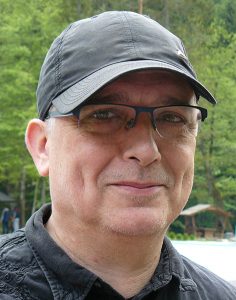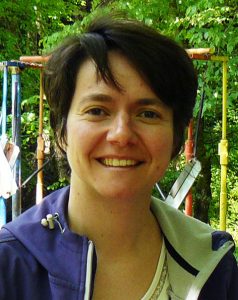
Patrick d’Hugues is a microbiologist with an engineering degree in biotechnology. In 1996, he got a PhD in Applied Microbiology & Biotechnology with a work on gas analysis & process optimisation of a continuous bioleaching process. In 1997, he did a post-doc in Warwick University, under Dr Paul Norris supervision on High Temperature Bacterial Leaching. From 1997 to 1999, he worked as a R&D Engineer in LaSource SAS (Mining company) on the development of biological processes applied to mining and environmental fields. Patrick joined BRGM in 1999 and carried out R&D activities in Biotechnology, Biogeochemistry and Microbial ecology. In 2000, he spent 6 months in Uganda as a technical expert for KCCL Company on the first industrial plant producing cobalt using bioleaching technology.
From 2004 to 2010, Patrick d’Hugues was Project Manager at BRGM. He was the General Coordinator of the EC-FP6 European R&D project Bioshale ‘’Search for a Sustainable Way of Exploiting Back Shale Ores Using Biotechnologies’’. He was also a member of the Management Committee of the FP6 integrated project (BioMinE): “Biotechnology for Metal bearing materials in Europe”. In 2009, Patrick took the responsibility of coordinating the WorkPackage4 on “ecoefficient metal production methods and utilization of secondary materials in the frame of the 4 years EC-FP7 R&D project PROMINE.
At present, Patrick is the Team Manager of the BRGM Waste and Raw Material Unit. This R&D team of 16 people (Process and environmental engineers & researchers) works on process development & environmental analysis (including LCA) in the field of mining waste management, recycling, water management and primary resources treatment (mineral processing & extractive metallurgy).

Dr. Stéphanie Muller holds a Ph.D in Life cycle assessment (LCA) from Polytechnique Montreal where she specialized in uncertainties quantification in LCA. At BRGM since October 2016, she is involved in different projects (LCA and LCI – life cycle inventory – studies applied to raw and secondary materials and wastes, input-output analysis,…). Publications: Muller, S., Mutel, C., Lesage, P. and Samson, R. (2017), Effects of Distribution Choice on the Modeling of Life Cycle Inventory Uncertainty: An Assessment on the Ecoinvent v2.2 Database. Journal of Industrial Ecology. doi:10.1111/jiec.12574
Dr.-Ing. Yannick Menard
Doctor Engineer in Process Engineering, Yannick Menard has over 15 years of experience in the development of techniques for primary raw materials processing (ores, mining residues and beneficiation tailings) and secondary raw materials recycling (waste from the extractive metallurgy, construction waste, electronic waste).
His expertise covers the development of weakening / fragmentation techniques, the development of physical and physico-chemical processes for the treatment of mine drainage, polluted soils, waste and raw materials, the design of extractive metallurgy bioprocesses, the design and development of multi-scale pilots for the processing of minerals and waste and the environmental assessment of products and processes. This expertise also includes the mathematical modeling of processes including mechanistic approaches (computational fluid dynamics) and systemic (mass balances, thermodynamic calculations).
For 6 years, he has been responsible for BRGM’s research activities dealing with the development of innovative techniques for the exploitation of mine and urban mine resources.
Jérôme Bodin
Jérôme Bodin is a mineral processing engineer and obtained both engineering and master degrees on mineral raw materials in 2013. Experienced in hydraulic separations and beneficiation of industrial minerals (china clay, phosphate, feldspar, talc), he conducted at NEYRTEC Mineral lab and pilot scale operations dedicated to industrial implementation until equipment commissioning. Mr. BODIN joined BRGM in 2016 since when he has been involved in European project (ECOMETALS, INTMET, and IMPACT). He particularly carried out work on process simulation with USIM-PAC© as well as experimental work upon comminution and beneficiation of low grade and complex polymetallic Cu-Pb-Zn ores.
Guillaume Bertrand
Guillaume Bertrand is a research engineer at BRGM (the French geological survey), specialized in primary mineral resources. After earning a PhD in tectonics and geodynamics (1999) and two post-doc positions (thermochronology at the University of Houston, USA, and neotectonics at the University of Freiburg Im Breisgau, Germany), he started working at the French geological survey in 2003, in the seismic risk team, on seismogenic tectonic structures and the evaluation of seismic hazard. Since 2008, he works at the BRGM’s Georesources Department on the link between geodynamics and ore bodies, deposits databases and mineral prospectivity mapping. He has managed several internal research projects and is involved in several past or ongoing EU projects (e.g., ProMine, EURare, Minerals4EU, REFRAM, IMP@CT,…), in some of which he was work package leader (e.g. MINVENTORY project) or task leader (e.g. REFRAM project). His contribution to the IMPaCT project is in building a database of complex small scale high grade deposits in Europe (task 2.1).”
